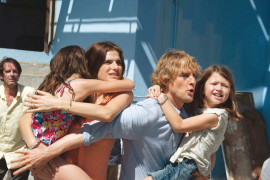
Thomas McCarthy’s remarkably accurate, well-paced, lucid, authoritative and moving Spotlight is important not just for highlighting the need for proper investigative journalism but also because it tells the harrowing tale of widespread child abuse by Roman Catholic priests in Massachusetts and its relentless cover-up by the Catholic archdiocese of Boston with grave seriousness, requisite authority and horrifying impact.
The film is based on the explosive series of articles, published in 2002, that uncovered the Catholic Church’s longstanding tradition of ignoring, allowing and enabling the abuse of children by its priests. The stories earned the Boston Globe the 2003 Pulitzer Prize for Public Service and forced the resignation of Cardinal Bernard F Law. Spotlight details the methodical and disciplined uncovering of the scandal by the Spotlight team.
The film benefits from four smart decisions and is, hands down, the best movie of the year thus far.
One, it tells the story from the perspective of the investigating journalists. This affords an intimate look into the world of investigative journalism and builds a bond between the audience and the characters in the film. The procedural is fascinating in its depiction of the inner workings of a newspaper.
Two, it does not lionise the journalists at the expense of the victims. The focus of the story rests squarely on abuse survivors. There is no glorification of admittedly great journalists. In a few brief, but emotionally wrenching scenes, McCarthy shows the pain and trauma caused by abuse. Neal Huff and Michael Cyril Creighton’s deeply moving performances as survivors demonstrate the deep and lingering trauma that haunts children long after abuse stops.
Three, Spotlight does not give star treatment to any one actor and allows each one full room to perform well. The film stars Brian d’Arcy James, Michael Keaton, Rachel McAdams, Mark Ruffalo, Liev Schreiber and John Slattery as Globe journalists. The actors play their roles with immense realism, without any affectation or desire to outshine others, allowing their characters to meld gracefully into a powerful ensemble. The film does not have a lead actor; the strong performances of each one of the six primary actors, along with those of Billy Crudup and Stanley Tucci, deserve awards. If ever there was a need for the category of Best Ensemble of Actors in the Oscars, this is it.
Four, and most importantly, Spotlight chose to be deliberately understated, muted and low-key. It examines the work of a team of dedicated journalists in a realistic, seemingly cold and distant manner. There are no highly dramatic scenes, no intense monologues and certainly no melodrama. The saga of decades of clerical abuse and the church’s history of complicity, deception, secrecy and denial is potent and powerful; the film is smart to recognise its inherent dramatic strength and lets the events create horror and drama.
The story of Spotlight was not limited to Massachusetts, it had no boundaries. As the credits roll towards the end, it is painfully obvious that a culture of secrecy, a self-serving belief in forgiveness, power without accountability, solidarity without conscientiousness and a reckless reluctance for self-examination have conspired to create an empire that is completely and solely responsible for ruining the lives of hundreds of thousands of people around the world.

Published in The Express Tribune, Sunday Magazine, December 13th, 2015.


















1713916020-0/WhatsApp-Image-2024-04-24-at-4-44-01-AM-(1)1713916020-0-270x192.webp)




1713904359-0/burn-(1)1713904359-0-270x192.webp)















COMMENTS (2)
Comments are moderated and generally will be posted if they are on-topic and not abusive.
For more information, please see our Comments FAQ